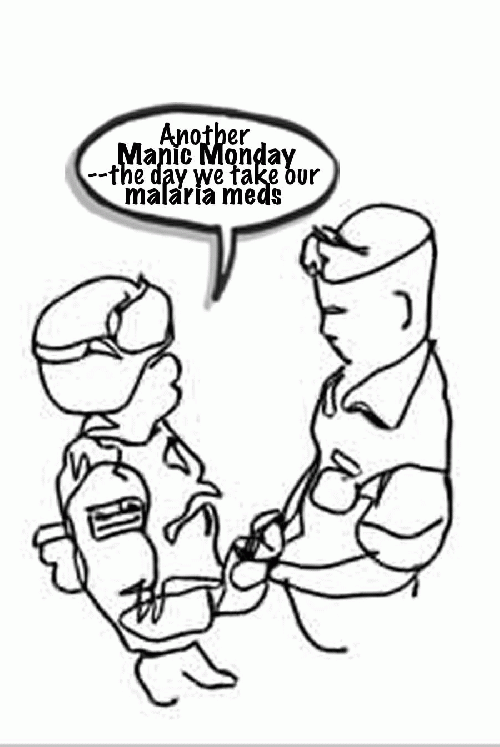(Article changed on April 8, 2014 at 09:26)
The malaria drug Lariam (mefloquine) is linked to grisly
crimes like Army Staff Sgt. Robert Bales' 2012 murder
of 16 Afghan civilians, the murders of four wives of Fort
Bragg soldiers in 2002 and other extreme violence. While the FDA beefed up
warnings for mefloquine last summer, especially about the drug's neurotoxic
effects, and users are now given a medication guide and wallet card,
Lariam and its generic versions are still the third most
prescribed malaria medication in the US. Last year there were 119,000
prescriptions between January and June. Though Lariam/mefloquine is banned in
Air Force pilots, until 2011, it was on
the increase in the Navy and Marine Corps.
The negative neurotoxic side effects of mefloquine can last for "weeks, months, and even years," after someone stops using it, warns the VA. Medical and military authorities say the drug "should not be given to anyone with symptoms of a brain injury, depression or anxiety disorder," reported Army Times--which is, of course the demographic that encompasses "many troops who have deployed to Iraq or Afghanistan." In addition to mefloquine's wide us in the military, the civilian population taking malaria drugs includes Peace Corps and aid workers, business travelers, news media, students, NGO workers, industrial contractors, missionaries and families visiting relatives, often bringing children.
What makes mefloquine so deadly? It has the same features that made the street drug PCP/angel dust such an urban legend in the 1970s and 1980s. It can produce extreme panic, paranoia and rage in the user along with out-of-body "dissociative" and dream-like sensations so that someone performing a criminal act often thinks someone else is doing it . ("Dust" users were also reportedly impervious to pain and anecdotally, could pop their own handcuffs.) An example of such "dissociative" effects is seen in Staff Sgt. Robert Bales' rampage; according to prosecutors at his trial, Bales slipped away from his remote Afghanistan post, Camp Belambay, in a T-shirt, cape and night vision goggles and no body armor to attack his first victims. He then returned to the base and "woke a fellow soldier, reported what he'd done, and said he was headed out to kill more." What?
In addition to Army Staff Sgt. Robert Bales' 2012 attacks and the 2002 Fort Bragg attacks, Lariam/mefloquine was linked, in news reports, to extreme side effects in an army Staff Sergeant in Iraq in 2005 and to the suicide of an Army Reservist in 2008.
Former Army psychiatrist Elspeth Cameron Ritchie, former U.S. Army Major and Preventive Medicine Officer Remington Nevin and Jerald Block with the Portland Veterans Affairs Medical Center agree in a recent paper that mefloquine may be behind "seemingly spectacular and impulsive suicides." It can produce "derealization and depersonalization, compulsions toward dangerous objects, and morbid curiosity about death," they write, describing frequent hallucinations "involving religious or morbid themes" and "a sense of the presence of a nearby nondescript figure." The researchers refer to two reports of people jumping out of windows on mefloquine under the false belief that their rooms were on fire.
In 2009, the Army Surgeon General and Deputy Assistant Secretary of Defense sent directives making Lariam a last choice drug for troops and last fall the Army banned it for the approximately 25,000 Green Berets , Rangers, Civil Affairs and Psychological Operations soldiers. But since the neurological effects of Lariam can continue indefinitely, troops and veterans may still be under its effects even if the drug has stopped being prescribed.
Lariam/mefloquine is one of five malaria drugs listed by the CDC for people who will be exposed to malaria. Other drugs include Malarone, a combination of the drugs atovaquone and Proguanil, Aralen (chloroquine,) primaquine and the antibiotic doxycycline marketed as Vibramycin. None of the drugs are ideal--Malarone can, for example have renal effects, and Aralen can have liver, blood and skin effects. Some do not work right away or are ineffective against resistant malaria strains. But the main reason for mefloquine's historic popularity is that it is taken weekly unlike all the other drugs (except chloroquine) which are taken daily. Some travelers also report that mefloquine is cheaper than other malaria drugs and say they only experience symptoms like memory loss and vivid nightmares. Still, since awareness of mefloquine's dangers, many users are now required to read and sign an informed consent form.
(Note: You can view every article as one long page if you sign up as an Advocate Member, or higher).






